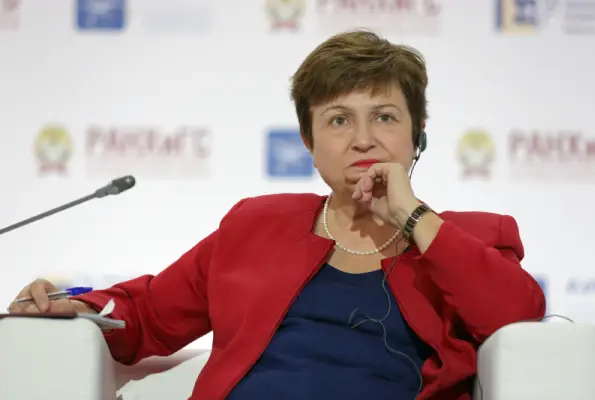IMF’s World Economic Outlook in April 2024 will emphasize somewhat better global growth due to the United States and several emerging market economies witnessing solid activity. Still, there are a lot of reasons to be concerned, according to IMF head Kristalina Georgieva.
At an Atlantic Council event, Kristalina Georgieva listed the growth’s causes as including persistent company and household investment, a reduction in inflation, and ease in supply chain issues.
However, there are still a lot of issues to be concerned about. The world has become increasingly difficult.
“World economic fragmentation is more likely when geopolitical tensions persist,” Kristalina Georgieva stated further.
Ahead of the US spring meetings, the Bulgarian economist was reappointed to the position of managing director of the IMF for five years.
Kristalina Georgieva claims that since the global financial crisis, economic prospects have slowed down as the debt has increased, fiscal buffers have been exhausted, and inflation is still a significant threat to national budgets in many nations.
“The pandemic’s wounds still bother us. The most disadvantaged nations bear a disproportionate share of the expenditures associated with the USD 3.3 trillion global output loss since 2020,” she remarked further.
There is an increasing difference both inside and across nation groups, according to the IMF’s head. The countries with lower incomes, where the pandemic’s effects have been most severe, exhibit the most notable variance.
The United States economy has recovered the fastest among developed nations, mostly due to increased productivity growth. She continued by saying that among emerging market economies, Indonesia and India are doing better.
Meanwhile, as per a recent analysis by Oxfam International, a massive 60% of all countries receiving grants or loans from the International Monetary Fund and World Bank are witnessing high or increasing income inequality.
The non-profit organisation further stated that of 106 such countries, income inequality is either high or rising in 64. The level is considered high when the Gini coefficient, a measure where 0 represents perfect equality and 1 represents perfect inequality, is above 0.4, the warning mark set by the United Nations.
The Oxfam analysis further revealed that income inequality is high in 42 countries, including Ghana, Honduras and Mozambique, and has risen in 37 countries over the past decade, including Burkina Faso, Burundi, Ethiopia and Zambia.
Another release issued by Oxfam stated that donor contributions to the World Bank’s International Development
Association (IDA), which provides grants or low-interest loans to the world’s poorest countries, over half of which are in Africa, have flatlined in recent years despite the increasing needs.
The revelation comes amid World Bank President Ajay Banga calling on donor governments to make the next IDA replenishment the “largest of all time”, which is important for low-income countries to combat rising debt.
Noting that ballooning debt and interest repayments are diverting resources from crucial areas like public education and healthcare, Oxfam continued, “Based on World Bank analysis, Oxfam finds that half of the IDA-eligible countries are over indebted and need nearly half (45%) of their debt cancelled.”
The organisation further suggested that the IDA funding shortfalls can be met by increasing taxes on the income and wealth of the world’s super-rich, which can raise trillions of dollars. The capital can also be used to fund the countries’ development and help them combat the effects of climate change.



